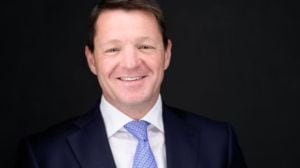Explained: Who is Moscow’s chief rabbi Pinchas Goldschmidt and why is he in exile?
One of Russia’s most influential Jewish leaders, Goldschmidt has served as Moscow’s chief rabbi for nearly three decades. He has also served as the head of the Conference of European Rabbis since 2011.
 Moscow's chief rabbi Pinchas Goldschmidt. (File Photo: AP)
Moscow's chief rabbi Pinchas Goldschmidt. (File Photo: AP)Moscow’s chief Jewish spiritual leader, rabbi Pinchas Goldschmidt, has fled Russia after coming under pressure to support the invasion of Ukraine. Swiss-born Goldschmidt — who has served as Moscow’s top rabbi since 1993 — escaped to Hungary with his wife just two weeks after Russia launched its attack on Ukraine and has since settled in Israel.
While the couple had claimed they were leaving the country to take care of the rabbi’s father in Jerusalem, their daughter-in-law has now confirmed that Goldschmidt was being pressured to voice his support for the war in Ukraine. “Can finally share that my in-laws, Moscow chief rabbi Pinchas Goldschmidt & Rebbetzin Dara Goldschmidt, have been put under pressure by authorities to publicly support the ‘special operation’ in Ukraine – and refused,” New York-based journalist, Avital Chizhik-Goldschmidt tweeted on Tuesday.
We take a look at who the Jewish spiritual leader is and what effect his leaving Russia has.
Who is rabbi Pinchas Goldschmidt?
One of Russia’s most influential Jewish leaders, Goldschmidt has served as Moscow’s chief rabbi for nearly three decades. “They are now in exile from the community they loved, built and raised their children in, over 33 years,” his daughter-in-law tweeted this week. Earlier this month, Goldschmidt was re-elected to serve as Moscow’s chief rabbi.
Can finally share that my in-laws, Moscow Chief Rabbi @PinchasRabbi & Rebbetzin Dara Goldschmidt, have been put under pressure by authorities to publicly support the ‘special operation’ in Ukraine — and refused. pic.twitter.com/Gy7zgI3YkJ
— Avital Chizhik-Goldschmidt (@avitalrachel) June 7, 2022
He has also served as the head of the Conference of European Rabbis since 2011. According to a statement released by the Conference of European Rabbis, Goldschmidt is presently in Israel with his father. The Ashkenazi and Sephardi chief rabbis of Israel have urged the leaders of Russia’s jewish community to respect Goldschmidt’s authority despite his absence from the country, The Moscow Times reported.
“The rabbinic court he headed continues to operate under his guidance and provides a proper response to those in need,” they wrote in a letter, according to a report by the Jerusalem Post.
What’s the Jewish population in Russia?
Jews first began residing in Russia in the 18th century after the partition of Poland. At the time, they were only permitted to reside in specific areas, known as ‘Pale of Settlement’, located in the western region of the Russian empire.
For centuries, the country’s Jewish community faced widespread discrimination, prompting many of them to join opposition parties, including the Bolsheviks. It was only after the revolution in October 1917, when the Bolshevik’s rose to power, that Jews were seen in positions of authority in the government and the secret police.
Following World War 2, the Soviet Union supported Jews in Palestine and was one of the first countries to recognise Israel as an independent nation. But when Israel’s ties with the West began to grow stronger, the relationship between the two countries started to thaw. This was also when the attitude towards Russian Jews began to sour. At one point, Stalin even considered deporting the Jewish population to the far east.
In 1967, the Soviet Union cut all ties with Israel. Around a million Jews fled during the Soviet era and the post-communist chaos, according to a Reuters report. In the decades after the Soviet Union collapsed, Russian jews faced widespread anti-semitism.
Presently, demographers estimate that there are about 150,000 Jewish people in Russia, The Guardian reported. Notably, Putin has justified the war in Ukraine by saying that the goal is to “denazify” the country, a claim that is ironic as Ukraine’s President Volodymyr Zelenskiy is Jewish and comes from a family that was partially wiped out during the Holocaust.
How has Russia’s Jewish community reacted to the war?
While Goldschmidt has not been vocal about his opposition to the war, several other Jewish leaders have spoken out against it. Russia’s chief rabbi Berel Lazar has condemned the war and offered to mediate between Kyiv and Moscow.
“Yes, we are different people, we can have completely different views on many problems. But in one thing we must be united: our duty to God is to strive with all our might for mutual understanding, for mutual respect, and in no case raise a sword against our brother,” he said in a statement, according to the Israeli newspaper Haaretz.
Lazar leads Russia’s Chabad movement, one of the largest Orthodox Jewish Hasidic groups in the world. He was considered to be close to Putin and has often been criticised for his unequivocal support for the president in exchange for his support for the Chabad community.
Newsletter | Click to get the day’s best explainers in your inbox
What stance have other religious leaders taken?
The head of Russia’s Orthodox Church, Patriarch Kirill, supported Putin’s war in Ukraine. He claimed that those opposing the invasion were “forces of evil” and even went as far as urging his followers to rally against Moscow’s enemies.
Initially, the European Commission, the executive wing of the European Union, had proposed sanctions against Kirill, including freezing his assets and a travel ban. But several EU leaders opposed the sanctions. Viktor Orban, the Hungarian Prime Minister with close ties to Putin, has stated in response that Hungary would not support the sanctions against Kirill because this was an “issue of religious freedom”.
Eventually the EU gave into Hungary’s demands and scrapped its plans for sanctions.
- 01
- 02
- 03
- 04
- 05






































